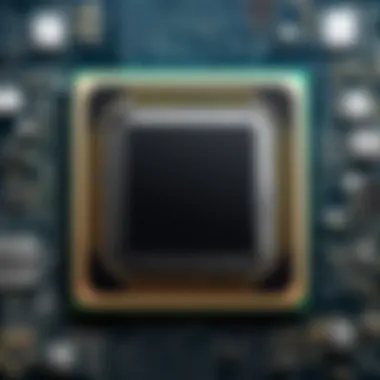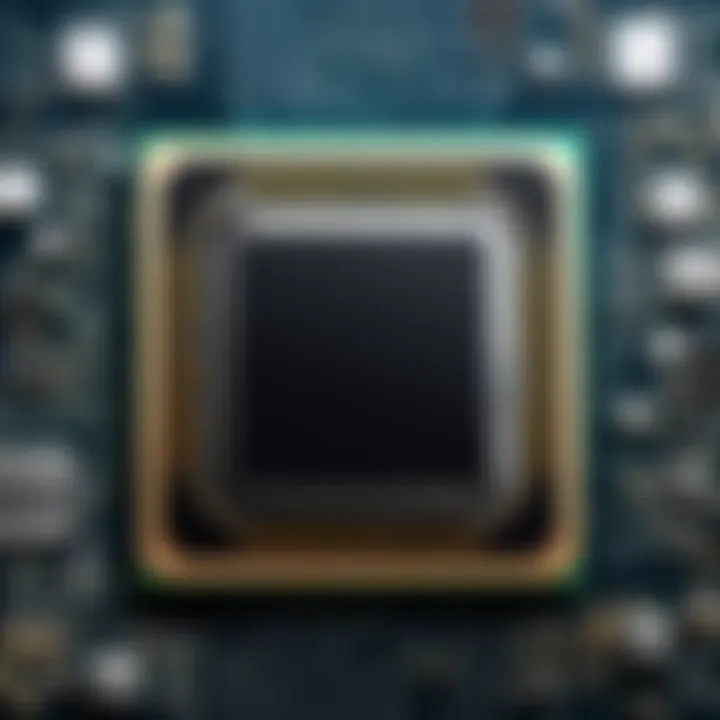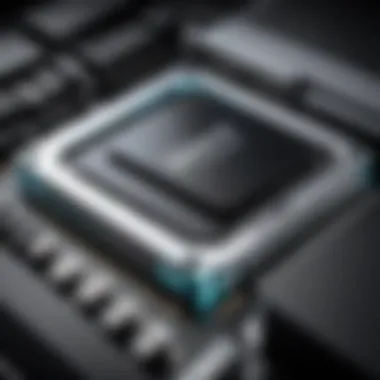Essential Gaming Laptop Specifications Guide


Intro
In the world of gaming, having the right tools can make all the difference. Choosing a gaming laptop means more than just selecting a laptop that looks sleek or has a famous brand. It's about understanding the specifications that impact your gaming experience. This guide aims to break down those critical components so you can make informed decisions and enhance your gaming sessions.
A gaming laptop typically comprises several vital specifications such as the processor, graphics card, memory, storage, and display technology. Each of these elements contributes uniquely to how well a laptop performs under heavy gaming loads. Understanding these specifications is essential, especially with technology evolving at a rapid pace.
This article will take a detailed look at each component you should consider when selecting your gaming laptop. By the end, you should feel equipped to evaluate laptops based on their specifications and how they align with your gaming needs.
Understanding Gaming Laptops
Gaming laptops represent a unique class of portable computers designed specifically for gaming enthusiasts and professionals. They offer enhanced performance features and specifications that contribute to a superior gaming experience. Understanding gaming laptops is essential for any potential buyer, as it influences both the selection process and eventual satisfaction with the device.
Definition and Purpose
A gaming laptop is primarily defined by its capability to run demanding video games, providing high frame rates and excellent graphics. Unlike standard laptops, these devices are equipped with powerful processors and dedicated graphics cards that enable them to handle the processing requirements of modern games. They are built not just for casual use but for immersive gaming experiences, often featuring advanced cooling systems and customizable components to optimize performance. The purpose of a gaming laptop is to deliver performance that meets or exceeds expectation, especially in competitive scenarios, where every frame counts.
Differences from Traditional Laptops
The distinction between gaming laptops and traditional laptops often lies in the hardware.
- Graphics Performance: Gaming laptops utilize dedicated GPUs from manufacturers like NVIDIA or AMD, while traditional laptops typically operate with integrated graphics, which may struggle with demanding titles.
- Cooling Mechanisms: Gaming systems have advanced thermal management solutions to prevent overheating during intense gaming sessions. Standard laptops may not emphasize this feature.
- Upgrade Capabilities: Many gaming laptops allow for easy upgrades of RAM and storage, a feature often limited in traditional laptops.
- Design Aesthetics: Gaming models frequently exhibit a distinctive design with LED lighting and aggressive styling, setting them apart from the more subdued look of standard laptops.
In summary, understanding gaming laptops and their specific attributes is crucial for making an informed purchase decision. The outlined differences highlight why gamers should prioritize specifications that support their needs.
"A powerful gaming laptop is not just about gaming; it is about enhancing the entire user experience in a portable form."
Being aware of these elements will empower buyers to select a device that perfectly aligns with their gaming aspirations, ensuring they are well-equipped to tackle any in-game challenges.
Key Specifications Overview
When it comes to gaming laptops, understanding the key specifications is crucial for anyone looking to make an informed purchase. These specifications outline how well a laptop can handle intensive gaming tasks and provide the performance necessary for a smooth gaming experience. The right specifications can significantly enhance gameplay, affect graphics quality, and ensure a device runs efficiently under load.
Importance of Choosing the Right Specs
Choosing the right specifications is vital because they directly impact not just the performance but also the longevity of your investment. A gaming laptop equipped with an outdated processor or insufficient memory may struggle with newer games, leading to a frustrating experience. Therefore, ensuring that the hardware meets or exceeds the current recommendations for games is essential.
Consider the following elements when selecting specs:
- Processor (CPU): The heart of the laptop. A powerful CPU like the Intel Core i7 or AMD Ryzen 7 can handle processing tasks efficiently.
- Graphics Card (GPU): The GPU is responsible for rendering graphics, an important aspect for visually demanding games. Options from NVIDIA or AMD are generally preferred.
- Memory (RAM): Sufficient RAM, typically 16 GB or more, allows for smooth multitasking and ensures that games can run without lag.
- Storage Type and Capacity: An SSD provides faster load times compared to an HDD, making gameplay smoother.
In essence, selecting the right specifications ensures that your gaming laptop can perform optimally across various games and applications.
Balancing Performance and Budget
Finding the right balance between performance and budget can be a challenging but necessary task. Gamers often face the dilemma of wanting high-end features without breaking the bank. This is where understanding specifications can aid in making compromises where necessary.
Here are some strategies for achieving optimal performance within your budget:
- Prioritize essential components: Focus on the processor and graphics card, as these will have the greatest impact on gaming performance.
- Consider slightly older models: Previous generation hardware can provide excellent performance at lower prices.
- Look for sales or bundles: Promotions from manufacturers can offer substantial savings on more powerful configurations.
"Investing in a gaming laptop is about understanding the trade-offs between performance, portability, and cost. Analyze your requirements to make an informed decision."
By doing so, you can achieve a perfect blend of capacity and pricing, ultimately enhancing your gaming enjoyment.
Processor Specifications
The processor is often the heart of any gaming laptop. It’s crucial because it dictates overall performance, impacting how efficiently the system runs games. Gamers often overlook processors when making a purchase, focusing instead on graphics card specifications or other shiny features. However, the processor executes tasks and operations that can significantly enhance gaming experiences. Choosing the right processor can lead to smoother gameplay, faster loading times, and effective multitasking. Thus, understanding processor specifications is vital for making an informed decision.
Top Processors for Gaming
Choosing among the latest processors is essential to maximize gaming potential. Popular choices include the Intel Core i9 and the AMD Ryzen 9 series. These processors offer superior performance for gaming, allowing users to run demanding games at high settings. Other options like the Intel Core i7 and AMD Ryzen 7 deliver excellent gaming capabilities as well, often at a more affordable price point.
Each of these processors boasts impressive features. It is critical to assess not just the brand but also the specific model within those families. In gaming, every frame counts. Thus, selecting a top-tier processor can make a substantial difference in both competitive and casual gaming scenarios.
Core Count and Threads
When evaluating processors, core count and thread support is a fundamental consideration. More cores generally allow for better multitasking. For gaming, quad-core processors were once considered the standard. Nowadays, six or even eight-core processors are becoming the norm due to their ability to handle modern games that leverage multiple cores effectively.
Hyper-threading technology can enhance performance by allowing each core to handle two threads, thereby improving efficiency. This can be particularly beneficial in CPU-intensive tasks beyond gaming, such as streaming or content creation. Hence, a higher core count combined with hyper-threading provides a solid advantage in overall performance.
Clock Speed and Performance Metrics
Clock speed, measured in gigahertz (GHz), indicates how fast a processor can execute tasks. Higher clock speeds typically mean better performance, but this metric alone does not paint the full picture. It’s crucial to consider the architecture of the processor, as efficiency can vary between different models.
Additionally, looking at performance metrics like benchmarks can provide insight into how a specific processor performs in real-world applications, especially in gaming scenarios.
For example, the Intel Core i9 processors typically excel in benchmarks, far exceeding older generations, making them a top pick for performance enthusiasts.
To summarize, understanding the intricacies of processor specifications can significantly impact your gaming experience. Assessing top processors, core count, and clock speed will ensure that the selected gaming laptop meets both current and future gaming demands.
Graphics Card (GPU) Insights
The graphics card is a central element in any gaming laptop. It defines the visual performance, capabilities, and overall user experience. For gamers, the GPU is often more crucial than the CPU, as it directly influences frame rates and the ability to render complex graphics. A high-quality GPU allows for smooth gameplay and stunning visuals, which can enhance immersion in gaming scenarios.
Dedicated vs. Integrated Graphics


When choosing a gaming laptop, one must consider the difference between dedicated and integrated graphics.
- Dedicated Graphics: These are separate cards, like the NVIDIA GeForce RTX or AMD Radeon series, designed explicitly for gaming and graphics-heavy tasks. They handle complex calculations and rendering processes without burdening the CPU, which improves performance significantly in demanding video games.
- Integrated Graphics: These are built into the processor itself. Models such as Intel's Iris Xe or AMD's Radeon Graphics suffice for casual gaming and basic tasks but may struggle with more demanding titles. While integrated graphics can reduce costs and improve battery life, they do not provide the same level of gaming quality as dedicated cards.
Choosing the right type of graphics greatly influences your overall gaming experience and performance.
Key Features of Gaming GPUs
Understanding the specifics of GPU technology can be a game-changer for serious gamers.
Ray Tracing
Ray tracing simulates realistic lighting, reflections, and shadows in a 3D environment. By tracing the path of light as pixels in a scene, this technology creates stunning visuals.
- Key Characteristic: High fidelity visuals and realism during gameplay.
- Popularity: With the growth of titles supporting ray tracing, such as Cyberpunk 2077, it has become a sought-after feature.
- Advantages: This technology enhances the aesthetic appeal of games.
- Disadvantages: It can be demanding on GPU resources, potentially lowering frame rates in non-optimized titles.
DLSS Technology
Deep Learning Super Sampling (DLSS) is an AI-driven feature by NVIDIA that enhances performance while maintaining visual quality. It upscales lower resolution images to near-native quality, providing a smoother experience.
- Key Characteristic: Increased frame rates without a significant loss in quality.
- Popularity: Many games now integrate DLSS, making it a compelling feature.
- Advantages: Players can enjoy smoother gameplay, especially in high-resolution settings.
- Disadvantages: Not all games support it, limiting its use to specific titles.
VR Gaming Capabilities
Virtual Reality gaming requires powerful GPUs capable of rendering high-quality environments in real-time.
- Key Characteristic: Immersive gameplay experiences provided through VR headsets like the Oculus Rift or HTC Vive.
- Popularity: With VR gaming growing in popularity, support for robust GPUs is essential for any serious gamer.
- Advantages: Offers unparalleled immersion and interaction in virtual environments.
- Disadvantages: VR gaming demands high performance, which can result in higher costs for compatible hardware.
Memory and Storage Considerations
The selection of memory and storage for a gaming laptop is not merely a technical decision; it significantly influences gaming performance and overall system responsiveness. Understanding the intricacies of RAM and storage types can vastly improve the gaming experience and ensure longevity in your investment. Specifying the right memory and storage not only enhances gameplay but also supports multitasking and loading times, which are critical for today’s demanding titles.
Importance of RAM in Gaming
Random Access Memory (RAM) plays a central role in a gaming laptop's performance. It influences how quickly applications can access data and the amount of data that can be handled simultaneously. Dependable gaming sessions rely heavily on adequate RAM. Insufficient RAM can lead to bottlenecks, causing lag and stutter during intense gameplay.
Generally, a minimum of 16GB of RAM is recommended for gaming. This provides ample space for the operating system and games to run smoothly without crashing or slowing down. For those who aspire to multitask by streaming or recording gameplay, 32GB or more might be necessary.
SSD vs. HDD: Which is Better for Gaming?
When examining storage options, gamers often grapple with the decision between Solid State Drives (SSD) and Hard Disk Drives (HDD).
- SSD Benefits:
- HDD Benefits:
- Speed: SSDs offer faster read and write speeds than HDDs, significantly reducing load times. This can mean having games load in seconds instead of minutes.
- Durability: With no moving parts, SSDs are less prone to mechanical failure.
- Cost: HDDs are generally less expensive per gigabyte, providing more storage capacity for the cost.
- Larger Capacities: Ideal for gamers with extensive libraries or who require substantial file storage.
A combination of both could be optimal. An SSD could host the operating system and primary games, while an HDD serves as a secondary storage option for less frequently accessed data.
Storage Capacity Recommendations
The amount of storage required varies based on gaming habits and preferences. Here are some guidelines to consider:
- For casual gamers:
512GB SSD or a 1TB HDD is a good starting point. This will accommodate a handful of games while allowing for essential programs and files. - For moderate gamers:
1TB SSD or 2TB HDD provides ample space for larger game files and applications. - For intense gamers or content creators:
Consider a 2TB SSD or a combination of a 1TB SSD and a 2TB HDD. This maximizes speed while providing plenty of additional storage.
Ultimately, the right memory and storage configuration not only enhances gaming performance but also aligns with user needs and future upgrades.
Display Specifications
Display specifications are critical in determining the overall gaming experience on a laptop. The screen serves as the primary interface between the user and the game. This section will explore elements such as screen size, resolution, and refresh rate to highlight their significance in gaming.
Screen Size Considerations
Screen size is an essential factor in choosing a gaming laptop. Gamers generally prefer a larger display for immersive experiences, especially in visually demanding games. Common sizes range from 15 inches to 17 inches.
- Portability: Smaller screens, like 15 inches, provide better portability. They are easier to carry around but might sacrifice some gaming immersion.
- Visual Experience: Larger screens, such as those measuring 17 inches, deliver a more engaging experience. However, they can be heavier and harder to transport.
- Personal Preference: Ultimately, the choice between screen sizes can depend on individual usage. Gamers who prioritize travel may lean towards smaller options, while those who set up a home gaming station might opt for larger ones.
Resolution and Refresh Rate
Resolution and refresh rate are two aspects that often dictate the visual quality and smoothness of gameplay.
- Resolution: This defines the number of pixels displayed on the screen. Common resolutions include 1920 x 1080 (Full HD), 2560 x 1440 (QHD), and 3840 x 2160 (4K). Higher resolutions lead to clearer images but demand more from the GPU.
- Refresh Rate: Measured in hertz (Hz), it indicates how many times the screen refreshes per second. Standard displays operate at 60Hz, while gaming displays commonly feature 120Hz or higher. A higher refresh rate translates to smoother gameplay, reducing motion blur.
It is important to choose a resolution and refresh rate combination that suits not only the games played but also the hardware capabilities.
In summary, display specifications are not to be overlooked. Both screen size and resolution contribute significantly to user experience. Selecting the right display can enhance enjoyment and performance in gaming.
Battery Life Expectations
A gaming laptop is designed for high performance, but this comes with a cost to battery life. Knowing how battery performance influences gaming experience is crucial for prospective buyers. The significance of battery life cannot be overlooked. It affects not only how long users can play before they need to recharge but also the overall convenience of using a laptop on the go. Surveillance on power consumption and battery duration is essential to ensure a smooth gaming experience.
Understanding Battery Performance
The performance of the battery in a gaming laptop is determined by several factors. First, the battery's capacity is measured in watt-hours (Wh). Higher capacity usually means longer battery life. Typical gaming laptops have batteries ranging from 45 Wh to 90 Wh. Having sufficient capacity is vital due to the energy demands of gaming.
Another aspect is the efficiency of components installed within the laptop. For example, modern processors and GPUs tend to be more energy-efficient compared to their older counterparts. This efficiency translates into better battery life overall. Furthermore, the display also plays a significant role. Higher resolution and refresh rates drain the battery more rapidly than standard configurations.


Regular updates to power management software are also important. Software that optimizes power usage can directly enhance battery performance. It is not wise to ignore these updates as they can keep a gaming laptop running efficiently, extending its lifespan during gameplay.
Power Consumption in Gaming Laptops
Understanding the power consumption of a gaming laptop is key to maintaining its performance. Gaming laptops typically consume more power than standard laptops. This difference can be attributed to the high-end components required for gaming tasks. A typical gaming laptop may draw between 45 to 180 watts depending on the load.
Power consumption can vary widely based on usage. For instance, a laptop running intensive games will consume more than one running basic tasks.
- Processor (CPU): The CPU is one of the largest power consumers. Higher-performance CPUs can consume over 35 watts during peak use.
- Graphics Card (GPU): The GPU is often the most significant contributor to power draw, reaching up to 150 watts during gaming.
- Display: The display backlight can consume a lot of power as well, especially in models with higher brightness.
Considering these variables helps users manage expectations regarding battery life. Finding a balance between performance and power consumption may lead to a more reasonable gaming experience without constantly relying on a power outlet. Standby modes, battery-saving settings, and understanding how background applications use power can all contribute to prolonging battery life during gaming sessions.
Pro Tip: For optimal performance, consider investing in a gaming laptop equipped with a robust cooling system. This can alleviate thermal throttling, ensuring your laptop continues to run at high performance without overconsuming power.
Ultimately, informed decisions around battery life and power consumption lead to a better gaming experience. Knowing what to look for in a gaming laptop's battery capabilities should guide your purchasing choices.
Cooling Systems and Performance
The gaming laptop experience is not solely reliant on the power of its components. One crucial yet often overlooked aspect is the cooling system. Efficient cooling systems ensure that hardware components do not overheat, which can lead to thermal throttling. This is when a processor reduces its performance to lower its temperature. For gamers, maintaining high performance under heavy loads is vital for optimal gameplay. Hence, understanding cooling systems becomes important in the selection of a gaming laptop.
Types of Cooling Systems
Various types of cooling systems in gaming laptops play a role in maintaining performance. Here are some key categories:
- Air Cooling: This is the most common type. It uses fans to circulate air within the laptop. While effective, the efficiency largely depends on design. Poorly placed vents can minimize airflow, leading to overheating.
- Liquid Cooling: A step up in technology, liquid cooling employs liquid coolant to absorb heat from critical components. This system is usually quieter than air cooling and struggles less with performance dips.
- Heat Pipes: These are commonly found in both air and liquid cooling systems. Heat pipes use pure substances that vaporize when heated, transporting heat away from the source before condensing back to liquid.
- Hybrid Systems: Some advanced gaming laptops combine both air and liquid cooling systems for optimal performance. This method generally offers better thermal management.
Each cooling system has its benefits and drawbacks, affecting overall gaming laptop performance. Selecting a laptop with the right cooling system can significantly impact the gaming experience.
Impact of Cooling on Performance
The influence of cooling systems on gaming performance cannot be understated. Proper cooling helps to ensure that:
- Consistent Performance: Maintaining low temperatures allows the CPU and GPU to perform at their peak. This reduces the chances of throttling, where the system slows down to cool off.
- Longevity of Components: Excess heat can degrade components over time. Efficient cooling systems can help prolong the lifespan of critical hardware.
- Quiet Operation: Efficient cooling often correlates with quieter operation. Laptops that struggle with heat tend to utilize loud fans to compensate, which can be distracting during gaming.
"A well-designed cooling system is essential for maximizing your gaming laptop’s potential."
Build Quality and Design
When selecting a gaming laptop, build quality and design are critical aspects that often influence a gamer's experience. A well-constructed laptop not only enhances durability but also affects practical use and comfort during extended gaming sessions. Users should look for materials that withstand wear and tear, as gaming laptops tend to endure long hours of use. This section examines the necessary materials to consider and the balance between aesthetics and durability.
Material Considerations
The materials used in a gaming laptop's construction significantly impact its overall performance and longevity. Common materials include aluminum and plastic, with aluminum often preferred for its sturdiness and premium feel.
- Aluminum: Laptops made with aluminum chassis typically offer better resistance against impacts and can be lighter than plastic alternatives. Additionally, they have a more aesthetically pleasing appearance.
- Plastic: While generally less durable, plastic can be advantageous in terms of weight and production cost. However, gamers should remain cautious of laptops made with lower-grade plastic that may not withstand heavy usage.
Other materials, like magnesium alloys and carbon fiber, are also becoming popular. They offer a desirable combination of lightness and durability. Ultimately, the choice of material contributes vital protective capabilities and aesthetics to the overall design.
Aesthetics vs. Durability
The design of a gaming laptop is not only about looks; it must also meet performance and durability criteria. Many gamers appreciate a visually appealing system, yet flashy designs can sometimes compromise reliability.
- Aesthetics: Sleek and modern designs, often complemented by RGB lighting, enhance the visual experience. A unique look can be a point of pride and a reflection of personal style.
- Durability: It’s essential to ensure that attractive designs do not lead to weaker structural integrity. For instance, some laptops might have sleek bezels or thin profiles but lack reinforcement around critical areas, leading to fragility.
The balance between aesthetics and durability is vital. A gaming laptop should look good while enduring daily stresses from portability and usage. Users should conduct thorough research on user reviews and expert opinions.
"A gaming laptop isn’t merely a tool; it’s an investment that should stand the test of time and style."
To sum up, build quality and design play a crucial role in the selection of a gaming laptop. With a keen focus on material considerations and the balance between aesthetics and durability, gamers can choose a laptop that not only meets performance demands but also provides lasting satisfaction.
Connectivity Options
In the realm of gaming laptops, connectivity options serve as a fundamental pillar. They connect the user to peripherals, the internet, and even external displays. A gaming laptop is not merely a stand-alone device. Instead, it thrives on an ecosystem of components that enhances performance and experience. Thus, understanding the various ports and wireless features is vital for gamers who seek to optimize their setup.
Essential Ports for Gamers
The variety of ports on a gaming laptop can significantly impact its usability. Here are key ports that one should look for:
- USB Ports: Look for at least three USB ports, ideally a mix of USB 3.0 and USB-C. USB-C is gaining traction due to its versatility, particularly for faster data transfer and charging capabilities.
- HDMI Output: For those who enjoy multi-screen setups or want to connect to a TV, an HDMI port is essential. HDMI 2.0 or higher supports 4K resolution.
- Ethernet Port: While Wi-Fi is prevalent, a wired Ethernet connection is superior for stability and speed in online gaming.
- Audio Jacks: At least one headphone and microphone jack are necessary, particularly for gamers who utilize headsets for communication.
- Thunderbolt 3: Many modern laptops offer Thunderbolt 3 ports, which support high-speed data transfer and can connect to external GPUs for enhanced graphics performance.
"The right ports can make a gaming laptop truly versatile, influence performance, and enhance the overall gaming experience."
Choosing a gaming laptop with adequate and diverse ports is crucial. This aspect allows for a seamless integration of devices like keyboards, mice, and external storage.
Wireless Connectivity Features
In addition to physical ports, wireless connectivity is vital for gamers. As online gaming grows in popularity, strong wireless capabilities ensure smooth gameplay.
- Wi-Fi 6: Newer gaming laptops should support Wi-Fi 6 (802.11ax). This enables faster speeds, lower latency, and better performance in crowded networks.
- Bluetooth: Look for Bluetooth 5.0 or higher. This ensures reliable connectivity with peripherals such as controllers, headsets, and more.
- Range of Connectivity: Assess the laptop's ability to maintain connections at varying distances. A good laptop should retain consistent performance even at moderate distances from the router.
Wireless connectivity features are important not just for gaming but also for streaming, downloading, and even casual browsing. With the right combination of wired and wireless options, a gamer can create a powerful and adaptable gaming setup.
Upgradability Prospects
Upgradability is a significant consideration for anyone looking to invest in a gaming laptop. Unlike desktop computers, which allow for more flexibility in upgrading parts, laptops can be more challenging in that regard. However, the ability to upgrade components can dramatically extend the life and performance of a gaming laptop.
Ease of Upgrading Components


When considering ease of upgrading components, buyers should look for models with accessible internal architecture. Some gaming laptops, such as the Alienware X17 and ASUS ROG Strix series, are designed with components like RAM and storage easily accessible. This design allows users to add more memory or swap out hard drives with relative ease.
- User Manual: Check the user manual before purchase; a clear guide can help demystify any upgrade process.
- Screw Placement: Laptops with screws that are easy to remove and clearly marked are generally better candidates for upgrades.
- Compatibility: Always ensure that the new components you wish to install are compatible with your laptop.
Future-Proofing Your Investment
Future-proofing is essential in the rapidly evolving technology landscape. Investing in a laptop that allows for upgrades can save money in the long run. By opting for a model that supports higher RAM and easy-to-replace storage options, users can keep up with the increasing demands of new games and applications.
- Higher RAM Capacity: Many modern games now require 16GB of RAM or more. Being able to upgrade your RAM means you can adapt to these changes without buying a new device.
- Storage Size and Speed: Solid-state drives are getting larger and faster. If your laptop allows for SSD upgrades, you can significantly improve loading times and overall system performance.
- Software Dependence: Games often demand more resources as they evolve. A laptop that is flexible in terms of hardware upgrades can handle new requirements better than a non-upgradable counterpart.
"A gaming laptop is not just about performance today but about how well it will serve you in a couple of years."
Software and Operating System
In the realm of gaming laptops, the software and operating system play pivotal roles in determining overall performance. When selecting a gaming laptop, it's not just about the hardware; the software environment creates the framework in which hardware operates.
The right operating system (OS) can significantly enhance the gaming experience by optimizing resource allocation and ensuring compatibility with various games and software applications. It is mandatory to consider how the OS interacts with the processor, graphics card, and other components to maximize performance.
Moreover, an efficient OS can streamline user experience. Features such as task scheduling and system updates will keep your laptop running smoothly during intense gaming sessions. The ability to customize settings for gaming purposes also cannot be overlooked, as it allows users to tailor the environment to fit their gaming preferences perfectly.
Best OS for Gaming Performance
A popular choice for gamers is Windows, particularly Windows 10 and Windows 11. This is primarily due to broad support for games and software applications. Most game developers optimize their titles for Windows, making it a safer choice for anyone heavily engaged in PC gaming. Furthermore, tools like DirectX 12 provide advanced graphics support, improving rendering and performance significantly.
However, others, like Linux, have gained traction. While still not as widely supported as Windows, gaming on Linux has become more feasible with the introduction of platforms such as Steam, which offers a growing library of compatible titles. The customization aspects of Linux can also attract advanced users, allowing them to configure their system precisely to their liking.
"Choosing the right OS can influence not only game performance but also system stability and compatibility with software updates."
Pre-installed Gaming Software Options
Another consideration involves pre-installed gaming software that often comes with laptops. This can include optimization tools that enhance system performance by managing resources effectively. Applications such as MSI Afterburner allow users to tweak settings for better performance and temperatures while playing.
Moreover, some laptops ship with their dedicated software suite, which may include features designed specifically for gamers. Examples can include game launcher applications, customizable macro settings, and performance monitoring utilities. Such tools might provide quick access to system stats, helping gamers to identify issues before they affect performance.
When assessing a laptop, examination of the pre-installed software should not be overlooked. It can contribute greatly to the gaming experience, adding extra functionality that complements the hardware. Gathering reviews about the effectiveness of the bundled software is also helpful in making an informed decision.
Price to Performance Ratio
Understanding the price-to-performance ratio is essential when selecting a gaming laptop. It represents the balance between how much money you pay and the level of performance you receive. This ratio is crucial because gaming laptops can vary significantly in pricing, and not all high-priced models deliver superior performance. Evaluating this aspect helps buyers make informed decisions and avoid overspending on features they may not need or utilize.
Evaluating Cost Against Specs
To properly assess cost against specifications, one must first identify which features are necessary for your gaming experience. Start by listing your prioritized components such as the processor, graphics card, RAM, and storage. Once you have your list, consider the following:
- Processor: Compare the price of different processors. Higher end models like the Intel Core i7 may be essential for intensive gaming.
- Graphics Card: Graphic performance matters. GPUs from NVIDIA and AMD often dictate the cost, with models like RTX 3060 yielding better visual fidelity at higher prices.
- RAM: Understanding RAM pricing helps you recognize how much memory you need without overspending.
- Storage Options: SSDs generally cost more than HDDs but can significantly enhance gaming performance, particularly load times.
Always check benchmark tests of the components you are considering. Tools like PassMark or 3DMark can offer insights. Results from these benchmarks can help you see if a laptop’s specs justify its price.
Identifying Good Value Models
Identifying good value models involves looking for laptops that offer a strong balance between specs and price. A good value model does not merely boast high-end features; it must deliver real performance for the cost. Here are some points to consider:
- Brand Reputation: Trustworthy brands like ASUS, Acer, or MSI typically maintain a consistent level of quality and support. This often translates into better value for your money.
- User Reviews: Platforms like Reddit and Amazon provide user feedback that can highlight the real-world performance of models you're considering.
- Sales and Discounts: Keep an eye on seasonal sales. Sometimes, higher-end models become affordable during promotional periods, allowing you to get more for your money.
- Warranty and Support: Consider what kind of post-purchase support you will receive. Strong after-sales support can enhance or affect the perceived value.
Choosing the Right Brand
Selecting the right brand for a gaming laptop is a critical decision that can significantly impact performance, reliability, and user experience. The gaming laptop market is flooded with options, but not all brands carry the same level of quality or support. A well-known brand often has established reputation, which usually correlates with the quality of their products. This section will focus on key considerations in selecting a brand for your gaming laptop, highlighting the benefits associated with trusted manufacturers.
Reputable Gaming Laptop Manufacturers
When it comes to gaming laptops, several manufacturers have built a solid reputation over time. Brands such as Alienware, ASUS ROG, MSI, Razer, and Acer Predator are recognized for their high-quality hardware and excellent performance. Each of these brands brings unique features:
- Alienware: Known for its premium build quality and innovative cooling systems, Alienware offers computers that are not only powerful but also visually appealing.
- ASUS ROG: This line includes impressive specs and customization options, making it a favorite among serious gamers.
- MSI: Their laptops are often praised for powerful graphics cards and reliable cooling systems, catering particularly to gamers who push their devices to the limit.
- Razer: Focused on delivering sleek design combined with performance, Razer laptops are popular for their portability and aesthetics.
- Acer Predator: This brand provides great value for performance, often featuring high refresh rate screens and robust gaming performance.
Choosing a reputable brand assures buyers that they will receive a gaming laptop that stands up to intensive use, has optimal thermal management, and offers adequate after-sales support.
Brand Support and Warranty Considerations
In addition to the laptop's specifications, brand support holds substantial weight in the buying decision. A reliable warranty and customer service can make a significant difference. Pick a manufacturer that provides clear warranty terms and responsive customer support. Many top brands offer extended warranties or additional coverage options that can be beneficial in the long run. Consider the following factors when evaluating brand support:
- Warranty Length: Longer warranties indicate confidence in product durability.
- Customer Service: High-quality support services can be a lifesaver for troubleshooting issues or obtaining replacements.
- Repair Services: Some brands ensure that repairs can be performed efficiently, minimizing downtime.
- Software Updates: Regular software updates can maintain device performance and security.
In a field where technology evolves constantly, having dependable support can help navigate the complexities of maintenance and upgrades.
Ensuring your gaming laptop is backed by a strong brand support system is essential for a stress-free ownership experience.
Ultimately, the choice of brand has ramifications beyond initial purchase. It influences the overall satisfaction and longevity of the gaming laptop, validating the importance of thorough research and consideration.
Epilogue
In concluding our exploration of essential gaming laptop specifications, it is vital to reaffirm the significance of understanding these components before making a purchase. A gaming laptop is not merely a device for playing games; it is an investment that affects the overall experience of gameplay, graphics, and even long-term performance.
Recap of Key Specifications
Each specification plays a distinct role in determining the laptop's capability:
- Processor: A strong CPU determines how well the laptop can handle demanding tasks and multitasking.
- Graphics Card: A dedicated GPU enhances visual fidelity and performance across various games, particularly in graphics-intensive titles.
- Memory: Adequate RAM ensures smooth performance, especially during gameplay and when running multiple applications.
- Storage: Fast SSDs generally improve load times and overall system responsiveness compared to traditional HDDs.
- Display: High-resolution and high-refresh-rate displays provide a more immersive gaming experience.
Understanding these specifications not only helps in identifying suitable devices, but also ensures that users know what to expect regarding performance and longevity.
Final Thoughts on Selection Process
When selecting a gaming laptop, consider how these specifications align with personal gaming preferences and needs. Evaluating the price-to-performance ratio is crucial. Look for reputable brands known for quality support and warranty options. Finally, remember that the right gaming laptop is a balance of performance and cost, ensuring you are not sacrificing essential features for aesthetics or novelty. By making informed decisions based on specifications, buyers can invest in a gaming laptop that meets their expectations and adapts to future needs.



